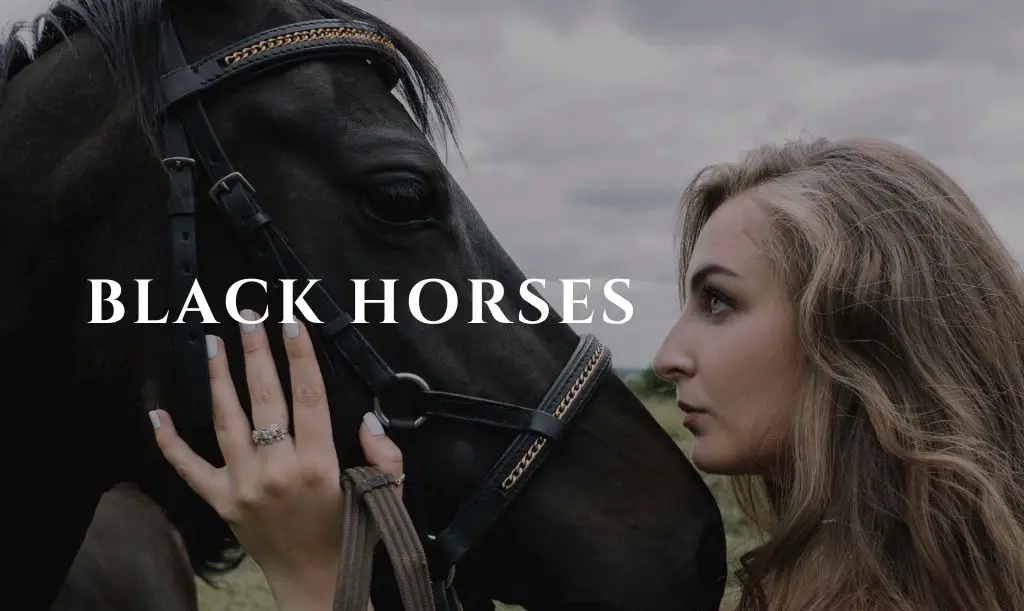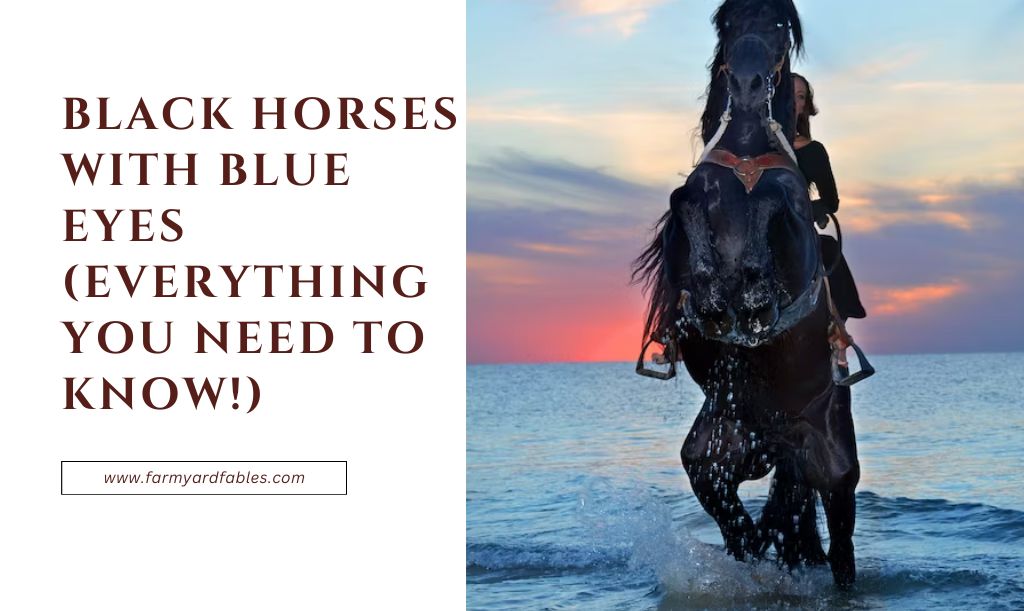Have you ever seen black horses with blue eyes?
Well, I have and they are a sight to behold!
Black horses with blue eyes evoke a sense of mystery and enchantment.
These magnificent creatures possess a rare combination that makes them stand out from the crowd.
While black horses alone are already quite striking, when coupled with mesmerizing blue eyes, they become even more extraordinary.
The occurrence of this fascinating trait is exceptionally rare, making black horses with blue eyes truly exceptional and highly coveted by equestrians and admirers alike.
Key Takeaways
- Black horses with blue eyes are a striking and visually captivating variation.
- The blue eye color is typically the result of a genetic factor known as the “splash white” gene.
- These horses may have one or both eyes with blue irises, and their eyes can vary in shade from light blue to deep blue.
- Blue-eyed black horses are relatively rare and often considered unique and attractive.
- While their eye color is captivating, it does not affect their vision or health negatively.
- Some black horse breeds, like the Friesian and Gypsy Vanner, may occasionally display blue eyes.
- Proper care, including protection from the sun and potential eye-related issues, is important for the well-being of these horses.
- Blue-eyed black horses contribute to the diversity and beauty of the equine world, making them sought after by horse enthusiasts.
The Mystique of Black Horses

Black horses have captured the imagination of cultures throughout history, becoming a symbol for power, mystery, and divine forces.
In ancient Greece, these ebony steeds were associated with the god of the underworld, Hades.
Often depicted pulling his chariot through the depths of the earth, black horses conveyed a sense of otherworldliness and strength.
Similarly, in Celtic mythology, black horses were seen as sacred animals that represented wisdom and connection to the spiritual realm.
The allure of these majestic creatures extended across continents, as even Native American tribes revered black horses for their supernatural qualities.
Banishing Misconceptions about Temperament
One common misconception that I’ve heard surrounding black horses is that they possess a fiery disposition or are more prone to aggression.
However, from experience, I know that such generalizations are far from accurate.
The temperament of a horse depends on numerous factors like breed, training, and individual personality traits rather than its coat color alone.
Black horses can display an array of temperaments just like any other horse breed out there – from calm and gentle to spirited and energetic.
It is essential not to judge a horse solely based on its color but to approach each equine individual with an open mind.
Understanding Eye Color in Horses
When it comes to eye color in horses, it’s not just a roll of the genetic dice.
There’s some fascinating science at work determining whether those peepers will be blue, brown, or something in between.
The color of a horse’s eyes is primarily determined by the distribution and concentration of melanin, which is responsible for pigmentation throughout the body.
But hold your horses!
It’s not just about melanin alone.
There are multiple genes involved in deciding the final hue of those captivating orbs.
Blue, Brown, and Everything In Between
Now let’s dive deeper into the kaleidoscope of eye colors found among our equine friends.
Brown eyes may be the most common sight on the equestrian landscape, but that doesn’t mean they’re any less enchanting.
Shades vary from deep chocolate to warm amber, depending on melanin distribution.
But what about those striking blue eyes?
While relatively rare in most horse populations, they are truly a sight to behold when they appear.
Blue eyes occur due to a lack or absence of melanin in the iris and can range from sky blue to a mesmerizing turquoise.
However, it is important to note that not all blue-eyed horses have black coats; they can be found across various coat colors and patterns.
And let’s not forget about heterochromia – nature’s way of adding an extra touch of marvel!
Heterochromatic horses possess two different eye colors, such as one blue eye paired with a brown or green eye – talk about standing out from the crowd!
This captivating phenomenon occurs due to variations in melanin distribution within each iris.
With such diversity in their ocular splendor, horses truly showcase nature’s artistic brushstrokes.
Whether they possess rich browns, captivating blues, or the intriguing allure of heterochromia, their eyes never fail to leave us spellbound.
Watch this:
The Genetics Behind Blue Eyes in Black Horses
When it comes to the captivating blue eyes found in black horses, one gene takes center stage – the PAX3 gene.
This remarkable gene, often referred to as the “master regulator,” plays a pivotal role in determining both eye color and coat pigmentation.
In black horses with blue eyes, a unique variant of the PAX3 gene known as PAX3-ASIP is responsible for this mesmerizing trait.
It’s worth noting that this specific variant is not present in all black horses but occurs sporadically due to genetic mutations.
It is these mutations that give rise to those striking azure orbs, transforming an already stunning equine into something truly extraordinary.
Interactions with Other Coat Color Genes
Genetics can be a complex puzzle, and understanding how the PAX3-ASIP gene interacts with other coat color genes adds another layer of fascination to the equation.
The intriguing part lies in how these genes work together to produce both eye color and coat pigmentation in black horses with blue eyes.
The presence of certain alleles or variations of other genes, such as KIT and ASIP, can influence how intensely the blue eye trait is expressed.
These interactions between different genes create an intricate tapestry where each thread contributes to the final masterpiece – a velvety black horse adorned with breathtaking sapphire-like eyes.
Whether you’re an equine enthusiast or simply appreciate nature’s marvels, delving into the genetics behind blue eyes in black horses unveils a world brimming with wonder and awe.
Through intricate mechanisms governed by genes like PAX3-ASIP, these enchanting creatures captivate our hearts and ignite our imagination like no other.
Health Considerations for Black Horses With Blue Eyes
Black horses with blue eyes possess an enchanting allure, but their captivating gaze comes with a few health considerations.
One significant concern is their heightened sensitivity to light.
The lack of pigmentation around the eye area makes them more susceptible to harmful ultraviolet (UV) rays from the sun.
Excessive exposure to sunlight can lead to conditions like photophobia (extreme light sensitivity), which can cause discomfort and even damage to the eyes.
These majestic creatures require extra care and protection from sunlight, especially during peak daylight hours when the sun’s rays are most intense.
Importance of Proper Care and Management for These Unique Individuals
Caring for black horses with blue eyes goes beyond providing shelter from excessive sunlight.
It is vital for owners or caretakers of these unique individuals to be attentive and proactive in maintaining their overall well-being.
Regular veterinary check-ups are crucial to monitor eye health and identify any potential issues early on.
Additionally, establishing a balanced diet rich in essential nutrients will contribute to maintaining optimal eye condition and overall vitality.
Owners should also consider employing certain management practices that prioritize the horse’s comfort and protection.
Providing ample shade in paddocks or turnout areas is essential, ensuring that horses have access to sheltered spaces during peak daylight hours when UV exposure is highest.
Equipping them with fly masks or specialized UV-protective eyewear can provide an additional layer of defense against harmful light rays.
Moreover, it’s important not only to pay attention to their eye health but also to maintain a comprehensive care routine that includes regular grooming sessions tailored specifically for black coats.
This entails employing appropriate products that enhance coat shine while taking into account any individual sensitivities or allergies that may arise due to an absence of pigmentation in the eyes and surrounding areas.
In short, owning or caring for a black horse with blue eyes requires an extra level of diligence and attentiveness.
By being mindful of their unique needs and implementing proper care and management practices, these remarkable creatures can thrive while maintaining their distinctive beauty.
Watch this:
Grooming Techniques Specific to Maintaining The Beauty and Health of a Black Horse’s Coat
To ensure the beauty and health of a black horse’s lustrous coat, regular grooming practices are crucial.
This includes using appropriate brushes and combs designed for equine hair to remove dirt, debris, and tangles gently.
Additionally, applying specially formulated coat conditioners can enhance the natural shine of their ebony coats, making them even more captivating.
It is essential to establish a grooming routine that not only keeps their appearance impeccable but also promotes their overall well-being.
Conclusion
Black horses with blue eyes truly embody an extraordinary blend of rarity, allure, and charm.
Their striking appearance has captivated admirers throughout history while evoking a sense of admiration and wonder.
Despite the potential challenges faced by owners in terms of eye care and coat maintenance, the rewards are immeasurable when it comes to owning these magnificent creatures.
The unique genetic combination that gives rise to black coats coupled with captivating blue eyes is nothing short of magical.
So if you’re lucky enough to encounter or own a black horse with mesmerizing blue eyes, relish in their exceptional beauty while cherishing them as living works of art on our earth’s canvas.
Related Articles:
FAQs
Can horses have blue eyes?
Yes, horses can have blue eyes, although it is relatively rare. Blue eyes in horses are typically the result of specific genetic factors, such as the “splash white” gene, and are often associated with certain coat colors and patterns.
What does a black horse symbolize?
Black horses have been associated with various symbolic meanings throughout history and across cultures. They often symbolize power, strength, elegance, and mystery. In some cultures, black horses are seen as symbols of protection and good luck, while in others, they may represent death or the unknown.
What are natural horse eye colors?
The natural eye colors for horses primarily include brown and variations of brown, such as hazel. Brown eyes are the most common among horses and are considered the standard eye color.
What are rare eye colors for horses?
Rare eye colors for horses include blue and green. These colors are less common and often result from specific genetic factors. Horses with blue or green eyes may have striking and unique appearances.
Are there white horses with blue eyes?
Yes, some white horses can have blue eyes. This eye color is often associated with white or gray coat patterns. White horses with blue eyes can have a captivating and distinctive look.
Can horses have pink eyes?
Horses do not naturally have pink eyes. Pink or red eyes in horses are typically caused by specific genetic conditions or health issues, such as albinism or certain eye disorders. Pink eyes in horses are exceptionally rare and can be associated with vision problems and sensitivity to light.
- Do Goats Sound Like Humans? Find Out Here! - 22 December 2023
- Vegetable Oil For Constipated Goat (Comprehensive Guide) - 22 December 2023
- Is Bermuda Hay Good For Goats? (Solved!) - 21 December 2023


